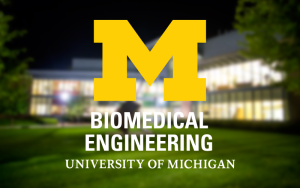Presented By: Biomedical Engineering
Studying Immunosuppressive Tumor Microenvironments for the application of CAR-T cell therapy in treatment of Metastatic Triple Negative Breast Cancer
BME Master's Defense: Devak Nanua

Triple Negative Breast Cancer (TNBC) is a highly aggressive form of breast cancer that makes up approximately 10 - 15 percent of cases. This specific subtype is characterized by the absence of Estrogen Receptors, Progesterone Receptors and Human Epidermal Growth Factor Receptor 2 (HER-2) on its cells. These three receptors are often targeted in commonly used breast cancer treatments and their absence limits treatment options for patients suffering with TNBC. A common treatment regimen for TNBC typically comprises a combination of chemotherapy followed by surgical intervention and radiation. However, this has many systemic side effects and limited efficacy in clearing advanced disease. The five-year survival rate for patients who suffer from a metastatic form of TNBC is 11% - making the prognosis for these patients quite devastating.
Chimeric Antigen Receptor (CAR) T cell therapy is an exciting new development in the field of cancer immunotherapy. T cells are engineered to have a receptor that targets a specific antigen that is commonly expressed on the surface of cancer cells. This therapy has been granted FDA approval largely for the treatment of blood related cancer such as leukemias and lymphomas through targeting the highly expressed CD19 antigen. Currently, work is being done to extend this promising therapy for the treatment of solid tumors (such as TNBC) in order to give people who suffer from this disease an effective alternative treatment. However, this has proven to be quite difficult for several reasons - one of them being the presence of an immunosuppressive tumor microenvironment.
Throughout this body of work, a CD19-expressing 4T1 murine triple negative breast cancer cell line was used as a model system to explore the immunosuppressive microenvironment in metastasizing TNBC and elucidate specific cellular mechanisms that cause suppression of CART therapy. First, T cell proliferation was measured in normal and conditioned media that were made from the primary 4T1 and metastatic 4T1 lung tumors grown in balb/c mice at the Day 7, 14 and 21 timepoints. The cytotoxicity of CD19 positive CAR-T cells was then measured when co-cultured with CD19-expressing 4T1 cells in the conditioned media from the metastatic 4T1 lung tumors. Next, single-cell RNA sequencing was performed on lungs from tumor-bearing mice in order to characterize the metastatic microenvironment and find potential transcription factors and specific cellular pathways that were upregulated. Finally, T cells were transfected with fluorescent transcription factor reporters in order to confirm the activation of specific transcription factors when cultured in the conditioned medias from metastatic 4T1 lung tumors.
As a result of these experiments, the presence of an immunosuppressive microenvironment that is specific to the conditioned media produced from metastatic 4T1 lung tumors at the Day 21 time point was shown. Results obtained also suggested the role of neutrophils in activating the transcription factor STAT3 which in turn upregulates the activity of the pd1/pdl1 pathway and leads to the suppression of T cell function in the metastatic microenvironment of Triple Negative Breast Cancer. Identifying these mechanisms are crucial as they will help improve CAR-T cell therapy and extend their application to the treatment of solid tumors.
DATE: Thursday, April 21, 2022
TIME: 12:30 PM
Zoom: https://umich.zoom.us/j/92806777883
Chair: Prof. Lonnie Shea
Chimeric Antigen Receptor (CAR) T cell therapy is an exciting new development in the field of cancer immunotherapy. T cells are engineered to have a receptor that targets a specific antigen that is commonly expressed on the surface of cancer cells. This therapy has been granted FDA approval largely for the treatment of blood related cancer such as leukemias and lymphomas through targeting the highly expressed CD19 antigen. Currently, work is being done to extend this promising therapy for the treatment of solid tumors (such as TNBC) in order to give people who suffer from this disease an effective alternative treatment. However, this has proven to be quite difficult for several reasons - one of them being the presence of an immunosuppressive tumor microenvironment.
Throughout this body of work, a CD19-expressing 4T1 murine triple negative breast cancer cell line was used as a model system to explore the immunosuppressive microenvironment in metastasizing TNBC and elucidate specific cellular mechanisms that cause suppression of CART therapy. First, T cell proliferation was measured in normal and conditioned media that were made from the primary 4T1 and metastatic 4T1 lung tumors grown in balb/c mice at the Day 7, 14 and 21 timepoints. The cytotoxicity of CD19 positive CAR-T cells was then measured when co-cultured with CD19-expressing 4T1 cells in the conditioned media from the metastatic 4T1 lung tumors. Next, single-cell RNA sequencing was performed on lungs from tumor-bearing mice in order to characterize the metastatic microenvironment and find potential transcription factors and specific cellular pathways that were upregulated. Finally, T cells were transfected with fluorescent transcription factor reporters in order to confirm the activation of specific transcription factors when cultured in the conditioned medias from metastatic 4T1 lung tumors.
As a result of these experiments, the presence of an immunosuppressive microenvironment that is specific to the conditioned media produced from metastatic 4T1 lung tumors at the Day 21 time point was shown. Results obtained also suggested the role of neutrophils in activating the transcription factor STAT3 which in turn upregulates the activity of the pd1/pdl1 pathway and leads to the suppression of T cell function in the metastatic microenvironment of Triple Negative Breast Cancer. Identifying these mechanisms are crucial as they will help improve CAR-T cell therapy and extend their application to the treatment of solid tumors.
DATE: Thursday, April 21, 2022
TIME: 12:30 PM
Zoom: https://umich.zoom.us/j/92806777883
Chair: Prof. Lonnie Shea